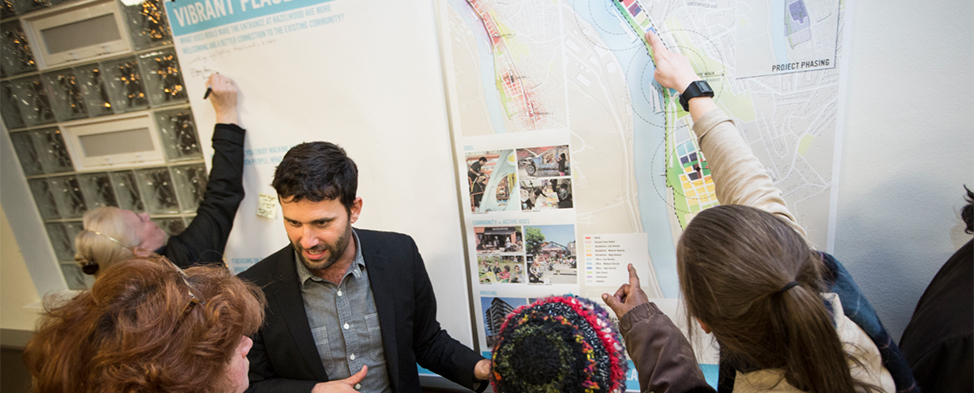 Hazelwood development community meeting. Photo by Annie O'Neill
Hazelwood development community meeting. Photo by Annie O'Neill
 Hazelwood development community meeting. Photo by Annie O'Neill
Hazelwood development community meeting. Photo by Annie O'Neill
The Endowments’ Sustainability strategic funding area incorporates the activities of the foundation’s former Environment & Health and Community & Economic Development program departments. The Sustainability funding area seeks to address underlying threats to Pittsburgh’s quality of life while focusing on opportunities to support the region’s health, safety and prosperity, now and for the future.
The Sustainability area’s vision is to contribute to a Just Pittsburgh, where economic and community development and healthy environment systems protect and benefit all citizens, where race, experience, identity and zip code do not determine life outcomes, where air and water are safe and where large sections of poor and vulnerable populations are not left behind.
As part of our Sustainability strategy, the Endowments seeks to improve the economic position of marginalized populations and places by advancing a clean economy, protecting the environment and public health and pursuing equitable development.
The Endowments also is focused on reducing disparities in our broad community related to environmental health, increasing access to healthy foods and successfully reintegrating veterans and their families into our community, in recognition of the assets they represent for our region.
Improve people's economic position through higher wages, family-sustaining employment and entrepreneurship.
Strategies:
Endowments point of contact: Rob Stephany, Director, Community & Economic Development
Advance a clean economy with renewables, green infrastructure and climate-friendly solutions.
Strategies:
Endowments point of contact: Philip Johnson, Director, Environment & Health
Pursue socially just economic opportunity so that distressed neighborhoods thrive without displacing vulnerable residents.
Strategies:
Endowments point of contact: Rob Stephany, Director, Community & Economic Development
Restore and protect Pittsburgh’s environmental systems, and enhance its public health.
Strategies:
Endowments point of contact: Philip Johnson, Director, Environment & Health
Promote community health and vitality through sustainable food systems, especially in food deserts.
Strategies:
Endowments point of contact: Andrew McElwaine, VP of Sustainability
Create communities where military veterans and their families are welcomed, valued and understood.
Strategies:
Endowments point of contact: Megan Andros, Program Officer, Community & Economic Development
“Hazelwood: Strengthening Community & Uplifting People” dives into the incredible work and vibrant partnerships of residents and organizations in the historic Hazelwood neighborhood.
"Hazelwood Green" outlines the stunning transformation of a former steel mill site into a community-guided development.







